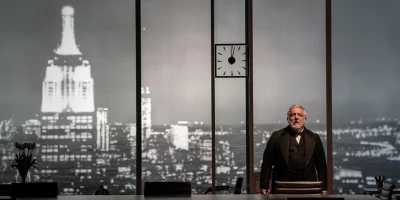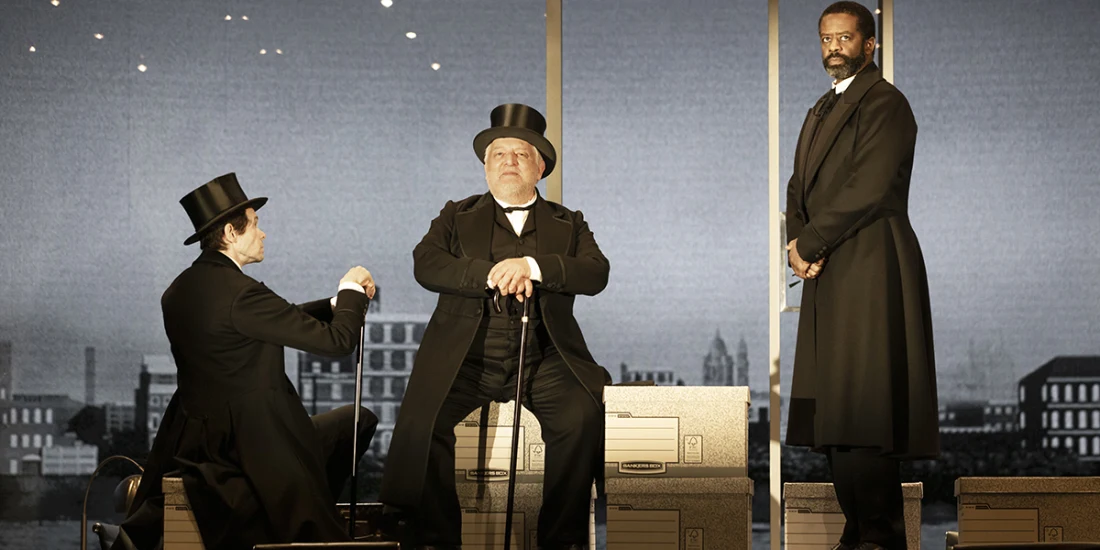
‘The Lehman Trilogy’ review — two centuries are condensed into a slick and selective history
The origin story of American capitalism has everything: enterprise, greed, delusion, recurring and precipitous falls from grace. The Lehman Trilogy delivers all this and more in a stunning feat of information. That director Sam Mendes manages to spin nearly two centuries of facts and figures into a handsome and engrossing spectacle is its own kind of historic achievement.
But lacking from this otherwise exhaustive cataloguing of our national folly is what's too often been perniciously glossed over in the mythologizing of American empire — blood. The Lehman Trilogy, in its epic scale as in its brimming contents, seems to romanticize the hardscrabble immigrant striving of its subjects while maintaining a scrupulous sort of blindness to the labor they exploited, enslaved or not.
The play by Stefano Massini, adapted from Italian into English by Ben Power, does not attempt an especially ingenious reframing, so much as an impressively theatrical one. American audiences, in particular, have likely heard much of this before, or something like it: Seemingly ordinary men with outsize ambitions tunnel their vision onto profit — more and more until there's never enough.
As embodied in knockout performances by the production's virtuosic stars — Simon Russell Beale, Adam Godley, and Adrian Lester — three generations of the eponymous brothers and their accomplices are rendered in extraordinary human detail. From the individual roots and flavor of their bone-deep avarice to how they hold their eyebrows just so, the multitude of men resurrected here are each distinct and vividly drawn.
Transfiguring the twists and turns of American finance into character-propelled narrative is The Lehman Trilogy's inarguable claim to magic. Curious about how our economy went from planting seeds in the ground to bloating with hot air? You'll get that, too, but do try to keep up.
As Es Devlin's sleek, glass-office set turns and turns, the particulars pile high. The first generation of brothers arrived from Bavaria, Germany to Montgomery, Alabama some 20 years before the Civil War. They invented the concept of middlemen, the play suggests, with their shuttling of raw cotton between plantations and fabric factories.
That word "raw" is repeated nearly a dozen times in the first act, and it's doing a lot of work. Chattel slavery is everywhere and nowhere in the story's first 20 years, like invisible air that fills the Lehmans' every breath and aspiration. Though slavery is lamented in passing as a crime and a shame, the play dwells rather on the toils and hard-won triumps of its many Jewish men. They slog like donkeys, weather innumerable tempests (like that pesky war that wipes out their cotton business), build Noah's Arc but for their company's sinking ship.
By the time Lehman Bank invests in the railroad, you'd wonder if it had been built by elves.
The play's oblique gestures toward the moral cost of the men's achievements are perhaps a touch too subtle. Considering its prodigious three-and-a-half-hour runtime, they flit by in a blink.
Though such myopia on the Lehmans' cravenness seems precisely the point, that doesn't make the near total excising of race from a contemporary account of American history any less tiresome. Lester, who is Black, is a new addition to the cast since this production from London's National Theatre was presented at the Park Avenue Armory in 2019. He is a marvelous performer. His casting also appears to be colorblind, deflecting from the text's skirting of race rather than commenting on it with discernable force or purpose.
The Lehman Trilogy paints gleaming and precise portraits of complex men (however delicately characterized by the actors, women are props and punchlines) — so much so that it's tough to tell whether we're meant to find them unflattering. Evil can be endearing. Easy villains are rare, and the complicated ones make for better plays.
But why do we keep retelling the tales of men who marched us into the fire thinking only of themselves? Everyone else is still sifting through the ashes.
Photo credit: The Lehman Trilogy (Photo courtesy of The Lehman Trilogy)
Originally published on
